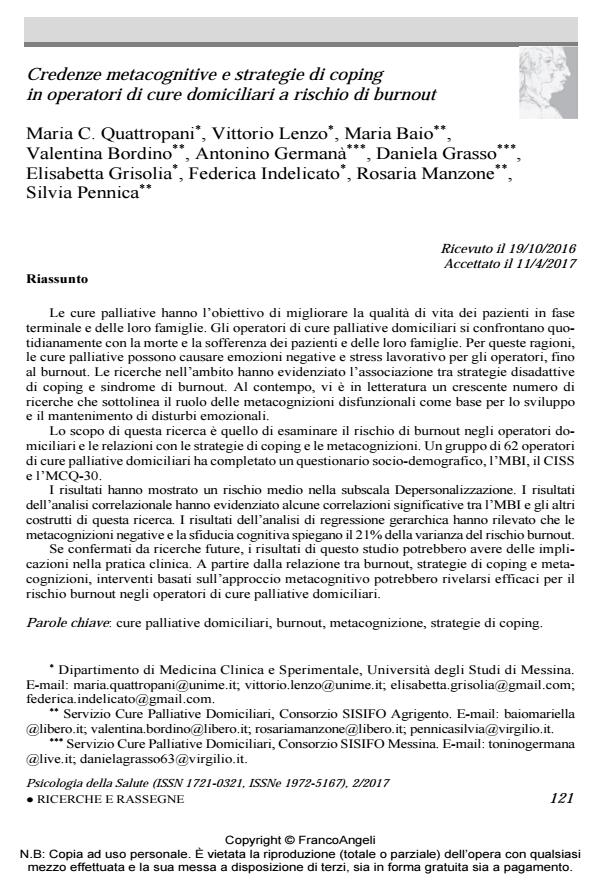Metacognitive beliefs and coping strategies in homecare professionals at risk of burnout
Journal title PSICOLOGIA DELLA SALUTE
Author/s Maria C. Quattropani, Vittorio Lenzo, Maria Baio, Valentina Bordino, Antonino Germanà, Daniela Grasso, Elisabetta Grisolia, Federica Indelicato, Rosaria Manzone, Silvia Pennica
Publishing Year 2017 Issue 2017/2
Language Italian Pages 22 P. 121-142 File size 274 KB
DOI 10.3280/PDS2017-002006
DOI is like a bar code for intellectual property: to have more infomation
click here
Below, you can see the article first page
If you want to buy this article in PDF format, you can do it, following the instructions to buy download credits

FrancoAngeli is member of Publishers International Linking Association, Inc (PILA), a not-for-profit association which run the CrossRef service enabling links to and from online scholarly content.
The aim of palliative care is to improve the quality of life of patients and their families facing the problem associated with life-threatening illness. Therefore, home care workers have daily confront with death and suffering of their patients and families. Hence, palliative home care may generate highly negative and stressful emotions for healthcare professionals, known as burnout syndrome. Research in the field of helping professions highlights the associations between dysfunctional coping strategies and burnout syndrome, but, at present, few studies explore the risk of burnout on home care workers. At the same time, there is a growing evidence for the metacognitions as the basis for the development and maintenance of emotional disorders. Aim of the present research is to examine the risk of burnout in palliative home care workers and its relationships with coping strategies and metacognitions. A sample of 62 healthcare workers of palliative care completed a demographic questionnaire, the MBI, the CISS and the MCQ-30. The results have shown that there was an average risk of Depersonalization subscale. Furthermore, results of correlational analysis have shown some significant correlations between MBI and other constructs. Finally, the results of regression analyses have shown that negative beliefs and cognitive distrust accounted for up to 21% of variance of risk burnout. If confirmed by future research, results of this study would have implications in clinical practice. Started from the relationship between burnout, coping strategies and metacognitions, psychological interventions based on metacognitive approach could have positive effects on palliative home care workers.
Keywords: Palliative home care, burnout, metacognition, coping strategies.
- Handbook of Research on Healthcare Standards, Policies, and Reform Vittorio Lenzo, Alberto Sardella, Maria C. Quattropani, pp.108 (ISBN:9781799888680)
- A Systematic Review of Metacognitive Beliefs in Chronic Medical Conditions Vittorio Lenzo, Alberto Sardella, Gabriella Martino, Maria C. Quattropani, in Frontiers in Psychology 2875/2020
DOI: 10.3389/fpsyg.2019.02875 - Stress, Burnout, and Resilience among Healthcare Workers during the COVID-19 Emergency: The Role of Defense Mechanisms Mariagrazia Di Giuseppe, Gianni Nepa, Tracy A. Prout, Fabrizio Albertini, Stefano Marcelli, Graziella Orrù, Ciro Conversano, in International Journal of Environmental Research and Public Health /2021 pp.5258
DOI: 10.3390/ijerph18105258 - Changes of narrative meaning-making markers
during the different phases of breast cancer
treatment for women below 50 years old Maria Luisa Martino, Daniela Lemmo, Anna Gargiulo, Daniela Barberio, Valentina Abate, Franca Avino, Maria Francesca Freda, in Health Psychology Report /2021 pp.58
DOI: 10.5114/hpr.2021.105363 - Longitudinal associations of depression, anxiety, and stress among healthcare workers assisting patients with end-stage cancer during the COVID-19 pandemic: the moderator role of emotional exhaustion Alberto Sardella, Alessandro Musetti, Christian Franceschini, Maria C. Quattropani, Vittorio Lenzo, in BMC Psychology 359/2024
DOI: 10.1186/s40359-024-01851-1 - Exploring emotions in dialog between health provider, parent and child. An observational study in pediatric primary care Francesca Dicé, Pasquale Dolce, Assunta Maiello, Maria Francesca Freda, in Pratiques Psychologiques /2020 pp.69
DOI: 10.1016/j.prps.2018.12.001 - Risk of burnout in a sample of oncology healthcare professionals working in a hospital oncology unit with hospice and relationship with dysfunctional metacognitive beliefs Vittorio Lenzo, Giuliana Maisano, Claudia Garipoli, Marcello Aragona, Antonella Filastro, Valeria Verrastro, Maria C. Petralia, Maria C. Quattropani, in Minerva Psichiatrica /2020
DOI: 10.23736/S0391-1772.19.02033-8 - Gli Interventi Assistiti dagli Animali come processi di promozione della salute. Una review sistematica Francesca Dicé, Antonio Santaniello, Federica Gerardi, Alda Paoletti, Paolo Valerio, Maria Francesca Freda, Lucia Francesca Menna, in PSICOLOGIA DELLA SALUTE 3/2018 pp.5
DOI: 10.3280/PDS2018-003001 - Dispositional Optimism and Context Sensitivity: Psychological Contributors to Frailty Status Among Elderly Outpatients Alberto Sardella, Vittorio Lenzo, George A. Bonanno, Gabriella Martino, Giorgio Basile, Maria C. Quattropani, in Frontiers in Psychology 621013/2021
DOI: 10.3389/fpsyg.2020.621013 - The interplay between burnout risk and attachment styles among palliative care practitioners Vittorio Lenzo, Alberto Sardella, Giuliana Maisano Branca, Valentina Bordino, Marcello Aragona, Claudia Garipoli, Adriano Schimmenti, Maria Catena Quattropani, in Psychodynamic Practice /2021 pp.1
DOI: 10.1080/14753634.2021.1922305
Maria C. Quattropani, Vittorio Lenzo, Maria Baio, Valentina Bordino, Antonino Germanà, Daniela Grasso, Elisabetta Grisolia, Federica Indelicato, Rosaria Manzone, Silvia Pennica, Credenze metacognitive e strategie di coping in operatori di cure domiciliari a rischio di burnout in "PSICOLOGIA DELLA SALUTE" 2/2017, pp 121-142, DOI: 10.3280/PDS2017-002006